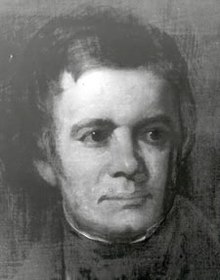David R. Porter
| David Rittenhouse Porter | |
|---|---|
 |
|
| 9th Governor of Pennsylvania | |
|
In office January 15, 1839 – January 21, 1845 |
|
| Preceded by | Joseph Ritner |
| Succeeded by | Francis R. Shunk |
| Member of the Pennsylvania House of Representatives | |
|
In office 1836 |
|
| Personal details | |
| Born | October 31, 1788 Norristown, Pennsylvania, U.S. |
| Died | August 6, 1867 (aged 78) Harrisburg, Pennsylvania, U.S. |
| Political party | Democratic |
| Spouse(s) | Josephine McDermott (m. September 28, 1820 – 18??) |
David Rittenhouse Porter (October 31, 1788 – August 6, 1867) was the ninth Governor of Pennsylvania. He served from 1839-45.
Porter, the first governor under the State Constitution of 1838 was born October 31, 1788, near Norristown, Montgomery County, Pennsylvania, spending his boyhood at Selma Mansion, a home built by his father in 1794. He was the son of Andrew and Elizabeth (née Parker) Porter. Andrew Porter distinguished himself in battle as a Revolutionary soldier, later became the state's surveyor general, but turned down an appointment by President Madison to become secretary of war. Andrew Porter's father, Robert Porter, Jr (1698 - 1770), was born in County Donegal in Ulster and settled in the Province of Pennsylvania.
Porter received a classical education at Norristown Academy. In 1813, he moved to Huntingdon where he studied law with Edward Shippen and eventually purchased an iron works. Due to the recession that followed the War of 1812 and his resulting business failure his life was changed by 1819. He turned to politics, being elected to the General Assembly, and married Josephine McDermott in 1820.
He also served in row offices in Huntingdon County and then was elected to the Pennsylvania Senate in 1836. In 1838 Porter was nominated for governor by the Jacksonian Democrats in order to mend the split between former Governor George Wolf and the Rev. Henry A. P. Muhlenberg, as well as defeat incumbent Governor Joseph Ritner's bid for a second term.
By then the public had grown tired of the Anti-Masonic Party's "witch hunts," giving Porter a slim 5,500-voter margin of victory. The election result was bitterly contested by Ritner's supporters nearly to the point of violence. Known as the "Buckshot War", Governor Ritner was forced to order militia intervention in Harrisburg for the peaceful transition of government. Porter's victory was certified by the legislature only a few days before his inauguration.
Upon taking office, Porter was immediately challenged with heavy state spending, coupled with a recession that began in 1837. Affable, eloquent, but succinct in expression, his statements often moralized against the improvident profusion in spending. He obtained a tax on persons in professions and the trades that was much like an income tax, and the first tax on capital stock shares. He cut state spending and hiring, although his administration continued the work on the expansion of canals and railroads.
...
Wikipedia
